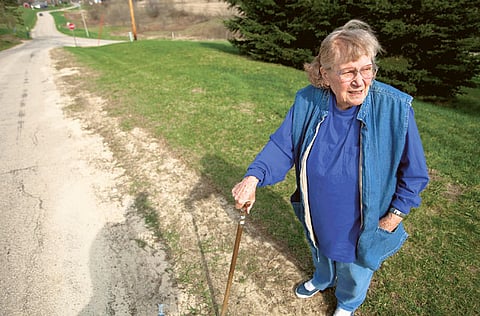Stalin daughter's passage to India
Svetlana's third husband hails from the regal family of Kalakankar

New Delhi: Svetlana Alliluyeva aka Lana Peters, the only daughter of Soviet dictator Joseph Stalin, who died in the United States, her adopted country, at the age of 85 recently, had a brief though momentous link with India and a particular Indian. This very Indian connection made her take the weighty decision to defect to the US where she lived until her death on November 22 this year.
Svetlana suffered from colon cancer and died in Richland, Wisconsin. Her death was announced almost a week late by Wisconsin authorities.
Very few know that she was greatly annoyed at the ill-treatment meted out to her third husband, Kunwar Brajesh Singh, an Indian politician belonging to the Communist Party of India, by the Soviet authorities in Sochi where she met him the first time. As a matter of fact, at the peak of communism, Svetlana caused an international furore when she barged into the US Embassy in New Delhi on March 6, 1967, seeking political asylum.
Criticising communism, the Communist Party of Soviet Union and her father, Svetlana even burnt her passport. She famously described her father Stalin at that time as a "moral and spiritual monster". Her defection was a huge embarrassment for the Soviet Communist Party. Then Soviet prime minister Alexei Kosygin condemned her defection to the US and described her as a "sick and morally unstable person".
"Brajesh Singh belonged to the Communist Party of India but briefly worked as a translator in the Russian capital Moscow. He would translate from Hindi to Russian for Progress Publishers there. He was Svetlana's third husband. Although Brajesh was already married in India, he and Svetlana decided to get married in 1964 and it was purely their personal decision," international affairs expert Qamar Agha told Gulf News.
Brajesh Singh died on October 31, 1966 in Sochi where he was recuperating from bronchitis in a hospital. Svetlana brought Brajesh's ashes to Kalakankar in Uttar Pradesh to be immersed in the river Ganges and stayed at his house for seven-and-a-half months.
Brajesh had royal lineage, hailing from the powerful and regal family of Kalakankar near Allahabad. His cousin Dinesh Singh was already a minister in the Indian Cabinet.
"The Russian media was completely controlled by the Communist Party and they did not report Brajesh Singh's marriage to Svetlana. Till the end, they maintained that it was a casual affair. But Svetlana always had very good relations with the western world. Nobody could prevent her from taking independent decisions which sometimes went against the image of her father under whose shadow she had spent some miserable years in the USSR. However, the Indian government allowed her to stay in India for some time. But it was her decision to abruptly seek political asylum from the American government," Agha adds.
Her wish
"Neither the Indian government nor the Communist Party of India reacted at that time to Svetlana's defection to the US as it was completely her wish where she wanted to live. I clearly remember that even the then Indian prime minister Indira Gandhi chose not to react to this development. It was purely Svetlana's personal decision and the Indian leaders respected that," Communist Party of India (CPI) leader Amarjeet Kaur says.
Interestingly, Brajesh Singh first married Kunwarani Laxmi Devi and later an Austrian lady Leela, with whom he had a son, Victor Singh, who became a famous photographer in the UK.
On the other hand, Svetlana, who graduated from the Moscow University in 1949, initially worked as a teacher and translator. She was married four times — three times in Russia — and left two children behind in her homeland.
It was when she married William Wesley Peters that she took the name Lana Peters. The duo, however, divorced soon after. Svetlana went back to the Soviet Union in the 1980s, only to return a year later. While in America, Svetlana wrote four best-selling books. She published her first memoir, Twenty Letters to a Friend, in 1968 which fetched her $2.5 million.
"The Soviet government was tracking Svetlana all the time, following her each and every movement; they wanted her back in the country at any cost. Svetlana pressed my father, Dinesh Singh, to ensure that she could be allowed to live in India for some more time," Rajkumari Ratna Singh, Member of Parliament from Pratapgarh constituency of Uttar Pradesh, says.
Ratna Singh, who is a daughter of former foreign minister Dinesh Singh and grand-niece of Brajesh Singh, recalls Svetlana as a caring person who brought gifts for the entire family of Brajesh when she came calling in India in 1966 to immerse his ashes.
Memorial
"She even wanted a memorial to be built in the memory of my grand-uncle Brajesh and she got in touch with socialist political leader Ram Manohar Lohia for the purpose. However, the memorial could not be built despite the fact that Svetlana arranged for all the money required for its construction," she adds.
Interestingly, an anecdote by author David van Praagh says that an Indian diplomat met Svetlana at a Switzerland airport. He got a letter signed by Svetlana, which was allegedly written by Dinesh Singh addressed to himself. The letter purportedly exonerated Dinesh Singh of any role in Svetlana's defection to the US. The idea behind the letter was to make sure that the Soviet Union did not hold him responsible for her defection.



